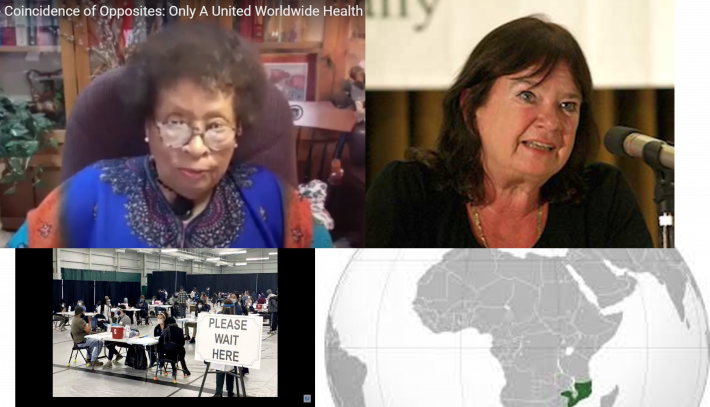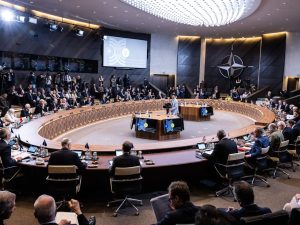større industrilande må samarbejde nu!

14. maj (EIRNS) – Følgende erklæring blev frigivet i dag af Komitéen for modsætningernes Sammenfald til det Globale Sundhedstopmøde i Rom den 21. maj 2021 og til almindelig omdeling.
Den eneste måde, hvorpå den langvarige COVID-19-pandemi kan stoppes, er ved at genoverveje løsningen. Vi må have moderne sundhedssystemer i alle lande. Dette betyder infrastruktur til folkesundhed og levering af lægebehandling på moderne standard til alle befolkninger. En model for dette er den amerikanske Hill-Burton-Lov (Lov fra 1946 om undersøgelse og opførelse af Hospitaler – Hospital Survey and Construction Act of 1946”), hvis princip var at angive, hvor mange hospitalssenge pr. 1.000 indbyggere, der skal være på hver lokalitet (på det tidspunkt, 4.5), og derefter handle for at bygge dem, inklusive moderne udstyr og personale.
Se på eksempler på vores evne til at gøre dette i dag. I Wuhan, Kina, blev Huoshenshan-hospitalet med 1.000 senge bygget på 12 dage i 2020. I USA blev flere felthospitaler bygget på rekordtid sidste forår af USA’s ingeniørkorps. Vi må gøre dette samtidigt overalt i verden.
Det betyder, at alle lande skal arbejde sammen for at opnå dette. Vi må foreløbig lægge spændinger og konflikter til side.
Der er nye mutationer af SARS CoV2/COVID-19, der dukker op, som er mere aggressive og mere smitsomme. Disse kan gøre vacciner forældede. ”Mange af disse varianter viser øget overførelsesevner og, i nogle undersøgelser, mere alvorlig sygdom,” hedder det i rapporten fra april af Dr. Dan Barouch, en immunolog ved Harvard Medical School, der hjalp med at udvikle Johnson & Johnson-vaccinen. Han sagde, at varianterne "også har den egenskab, at de er i stand til delvis at unddrage sig antistoffer, og derfor skaber frygt for, hvorvidt de kan reducere vaccineffektiviteten". Vi er i et kapløb mod tiden.
Derfor er vores reaktion på pandemien et spørgsmål af eksistentiel betydning for hele den menneskelige art. Det kræver samarbejde mellem alle større industrialiserede lande. Et nyt paradigme for koordinering mellem USA, Kina, Rusland og andre er centralt.
I denne ånd dannedes en gruppe i juni 2020, der blev kaldt Komitéen for modsætningernes Sammenfald, for at fremme et sådant internationalt samarbejde om en omfattende reaktion på krisen. Medstiftet af Helga Zepp-LaRouche, stifter og præsident for Schiller Instituttet og Dr. Joycelyn Elders, fhv. cheflæge for militærets sundhedskorps i USA, agerer komitéen efter princippet om "modsætningernes sammenfald" fremsat af kardinal Nikolaus fra Kues (Cusanus 1401- 1464), der forsøger at handle på basis af det almene vel og forhindre at sætte grupper op i mod hinanden.
Komitéen har to pilotprojekter i gang, der konkret indeholder dette princip for at fremme større regerings- og institutionelle handlinger. I Washington, D.C. i afdeling 8, arbejder et team – som involverer ungdomsledere – for at nå de fulde COVID-19-vaccinationsrater og igangsætte igangværende folkesundhedsforanstaltninger i det stort set fattige samfund. I Afrika ankommer snart komitéens forsendelse til Mozambique med kombinerede medicinske, sundhedsmæssige, vand-, mad- og frøforsyninger for at pointere, at både nødsituationer og generelle udviklingsforanstaltninger er presserende alle steder på kloden, hvor det behøves.
Sundhedssikkerhed overalt er kun mulig ved at tilvejebringe tilstrækkelig folkesundhedsmæssig infrastruktur og kapacitet til medicinsk behandling. Dette afhænger igen direkte af udvidelse af vand-, energi-, og fødevareproduktion, hvilket er forbundet med opbygning af industriel kapacitet, såvel som at tilvejebringe tilstrækkelige transportforhold, boliger og andre basale forhold. Samarbejde mellem nationer for at håndtere disse opgaver betyder nødvendigvis drøftelser om, hvordan man udsteder kredit og på anden måde håndterer det ustabile og uretfærdige finansielle system. Retningslinjer for et nyt paradigme for økonomisk udvikling blev præsenteret i en rapport: ”LaRouche-planen om genåbning af den amerikanske økonomi; Verden har brug for 1,5 milliarder nye, produktive arbejdspladser, ”(29. maj 2020, EIR, bind 47, nr. 22)
Læs resten af komitéens udtalelse på engelsk:
Global Health Infrastructure
The following are summary elements of what is required for health security. For details, see, “LaRouche’s ‘Apollo Mission’ to Defeat the Global Pandemic: Build a World Health System Now!” from April, 2020, by the Schiller Institute.
Hospital systems. There is currently a huge deficit of hospital beds. Today’s world total of 18. 6 million beds needs to be nearly doubled to some 35 million, along with staff and equipment. This calculation is based on the metric set in the post-WW II U.S. “Hill Burton Act,’ for 4.5 beds per 1,000 residents in the community, in order to provide treatment for both routine and surge circumstances. After the U.S. approached this 4.5 beds per 1,000 standard in 1980, the level then dropped back to 2.8 today, due to privatization and deregulation of U.S. health care. The ratio is 0.7 for the nations in the category of “Heavily Indebted Poor Countries.” For example, South Asia is 0.7. Nigeria has 0.5 beds per 1,000, which has one fifth of the population of Sub-Saharan Africa.
A mobilization is necessary for building strategically located military-style field hospitals, in conjunction with vaccination campaigns, while at the same time, moving to launch longer-term construction of durable hospitals, continuing the crash mobilization mode. E.G. In Ghana, there is the national plan for multiple 100-bed hospitals. Depending on the number of beds in each new hospital, the world faces a need for 35,000 new facilities, especially in Africa, Ibero-America and Asia.
Health corps. Vast numbers of doctors, nurses, public health and related staff—technicians, pharmacists, veterinarians, dieticians, administrators, etc. are required worldwide. Meeting this need demands the spectrum of training, ranging from many more teaching hospitals, to thousands of youth training programs for invaluable community health service, beginning with today’s pandemic emergency.
Water and sanitation. One fully-equipped hospital bed requires plumbing for at least 110-120 gallons of water a day. Every nation must have adequate water and sewerage. Today more than two billion people lack access to safe water, sanitation or both. The deployment of temporary sanitation facilities (which could be mass-produced and then distributed) will be a stop-gap measure, while durable improvements in infrastructure are constructed. Building largescale water management systems, for example, comprehensive river basin development in Africa and South America, along with littoral desalination—nuclear powered, as soon as possible—will end the extremes of drought and flooding, and provide millions of skilled jobs in the process.
Electricity. Modern medical treatment, including inoculation, is not possible without reliable, ample electricity, which of course is essential at large facilities. A large, modern hospital can use, roughly 19 million kilowatt hours per year of electricity for its many power requirements, including scanning and data devices, refrigeration, oxygen provision, ventilation, as well as lighting, cooking and cooling.
Science and technology. There must be an expansion of both basic research and development of technologies against diseases, including those affecting animals and plantlife. This is best done by collaboration among R and D institutions throughout the world. We must advance our understanding of viruses, such that in the near future we can do more than react to each new outbreak. In the immediate term, full collaboration on mass inoculation, and on anti-viral treatment regimens are essential to save lives.
“Food is medicine.” David Beasley, Executive Director of the World Food Program reported May 7 that nine million people died from starvation in 2020, more than the official death toll of 3.24 million from COVID-19. “Food is the best vaccine against chaos,” he stressed, early in the pandemic. It is urgent to provide the $5 billion requested by the WFP for extra 2021 food relief, over and above current levels of aid. There are over 270 million people in acute need of food, and another 600 million with food insecurity. Ten nations are in terrible famine—with the Democratic Republic of the Congo and other African nations in the lead, as well as Yemen, Syria, Haiti and other locations. In addition, interventions must be made to support independent family farming in many of the most highly productive agriculture regions in Europe, North America, Australia and South America, whose output is vital, but where the family farmer is being driven out of operation by the transnational food monopolies. Modern agriculture must be rapidly developed in Africa and elsewhere. The goal is to double food production, to ensure nutrition and health for all.
The Global Health Summit is the responsible representation of the world population in this moment of a crisis of Biblical dimensions. This meeting must not end without a decision to start a process of worldwide international cooperation for a crash program to build a modern health system in every single country on the planet, including the necessary infrastructure to sustain that system.






